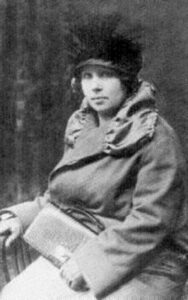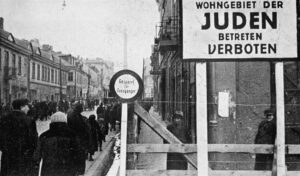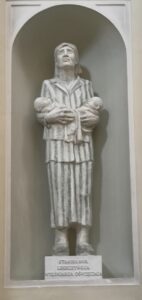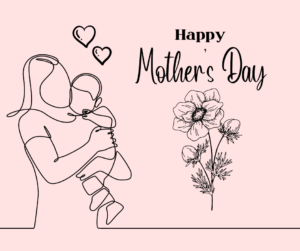
Polish midwife Stanisława Leszczyńska delivered 3,000 babies in Auschwitz under the most difficult, unsanitary, and inhumane conditions. She is remembered for her heroic humanity to the women of every nationality she served. This devout Catholic woman has been recommended for sainthood in the Catholic church. Read on for her humble, yet amazing story.
May is also for mothers. In the U.S. Mother’s Day is always the second Sunday in May. The Polish Mother’s Day is May 26. This Mother’s Day column is dedicated to this incredible woman and all the mothers and children she served.
Growing up in Łódż, Poland
Stanisława was born in 1896 to Jan and Henryka Zambrzycki in Łódż (pronounced ‘Woodge’) in the Russian partition of Poland. In 1916 Stanisława married Bronislaw Leszczyński, who was a printer. Their first son Bronislaw was born prematurely in 1917. From that experience, she wondered how she could serve women and babies in similar circumstances. After the birth of her second child, Sylwia, she made a bold choice for those times: to attend midwifery school in Warsaw. The program required she leave her children for two years. She graduated with honors, then returned to serve the mothers in Łódż.
Per an article in Church Life Journal in 2023, “After her return to Łódż, Stanisława began delivering babies (while herself giving birth to two more sons). The family lived in a largely Jewish neighborhood and Stanisława and the children spoke Yiddish. This talent would come in handy in Auschwitz when Stanisława found herself serving thousands of Jewish women of various nationalities. Stanisława had many Jewish friends and Jewish patients. She often visited synagogues to pray with the congregations there and often invited rabbis to the family home for a meal and a spirited debate.”
Germans establish the Łódż Ghetto

Germany invaded Poland on September 1, 1939, and occupied Łódż on September 8. The Germans annexed the city to the German-occupied territory. In early February 1940, they established a Jewish ghetto in the northeastern section of town, surrounding the area with barbed wire. Polish families were forced out, and about 160,000 Łódż Jews were forced into the ghetto. Stanisława’s family was forced to relocate as their home was in the area designated for the ghetto.
Living conditions in the ghetto were horrendous. Most of the quarter had neither running water nor a sewer system. Hard labor, overcrowding, and starvation were the dominant features of life. The overwhelming majority of ghetto residents worked in German factories and received only meager food rations. More than 20 percent of the ghetto’s population died as a direct result of the harsh living conditions. Eventually most would be transported to the killing center of Chelmno.
Arrested by the Gestapo and sent to Auschwitz-Birkenau
The Leszczyński family worked in the Resistance and continued to help Jews in the Ghetto. They helped some escape with forged papers that her husband Bronislaw made. Other times they snuck food in. In 1943, the Gestapo arrested Stanisława and three of her children, who were all in their twenties by now. After interrogation, she, and her daughter Sylwia were both sent to the Auschwitz-Birkenau concentration camp. Her two sons were sent to Mauthausen concentration camp. Her remaining son and husband escaped, but she would never see her husband again. He later died in the Warsaw Uprising.
There she presented herself as a midwife and asked to serve the pregnant women in the camp. Not all pregnant women were sent to the gas chambers on arrival. Perhaps their pregnancies didn’t show until after they had been in the camp. But in the maternity blocks, they at least held a glimmer of hope for survival under Stansława’s care. This woman, an angel of life, served under the “Angel of Death” Dr. Joseph Mengele. When she was ordered to kill any baby born to a Jewish woman, she refused.
The women slept in crowded, filthy conditions on lice-filled hay, under crawling rats, and above dirt or muddy floors. Yet every mother Stanisława attended survived childbirth, and every baby was born alive. The women called this Polish midwife “Mother.”
Sadly, only 30 out of 3,000 babies survived the death camp.
Before Stansława arrived in 1943, the policy was to drown babies after delivery. The female German capos did so under the orders of Dr. Mengele, to reduce the Jewish population. About 500 blond-haired blue-eyed babies were taken from their mothers for adoption by German families [as part of the insidious Nazi Lebensborn plan.] Food was scarce and many mothers were so malnourished they could not create milk or feed their children so both died of hunger, disease, and camp conditions.
In 1957, Stanisława presented a paper during a Polish midwives’ jubilee held in the health department of the Bałuty district of the city of Łódż. The report, “A midwife’s report from Auschwitz” is available online at this link: Click here. In it, she describes in detail the conditions she worked in. She ends it by saying “I am presenting my account on behalf of the mothers and children—those who could not tell the world about the wrong done them.”
Servant of God Stanisława Leszczyńska

The Diocesan phase closed on March 11, the 50th anniversary of her death in 1974.
Per the Church Life Journal, in June 2023: “[Polish midwife] Stanisława Leszczyńska died of intestinal cancer on March 11, 1974, and was buried in a Franciscan habit, her right as a Third Order Franciscan. Her funeral was attended by thousands of people: Jewish neighbors, Auschwitz survivors, babies she had delivered, and women she had attended in birth. And family. So much family.
A woman of deep prayer, profound clinical skill, and remarkable stubbornness, Stanisława served as a midwife for thirty-eight years and never lost a baby or a mother… She stands also as a witness to each of us in need of courage to live a life of costly love and radical self-sacrifice.”
Happy Mother’s Day to Stanisława and all mothers!
 Check out a previous Mother’s Day post dedicated to Irena Sendler, another amazing Polish Catholic woman who saved thousands of children from the Warsaw Ghetto. Click here.
Check out a previous Mother’s Day post dedicated to Irena Sendler, another amazing Polish Catholic woman who saved thousands of children from the Warsaw Ghetto. Click here.
In friendship,
Katrina


4 Comments. Leave new
Yes another untold story of Polish resistance and heroism during World War II. Thanks, Katrina, for sharing this one at Mother’s Day and all the great work you do!
Thank you!
Congratulations on the warm memory of one of many brave Polish women and mothers on the day of their holiday.
Happy Mother’s Day!
Thank you!